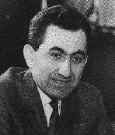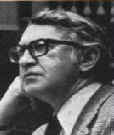strolling in the smoking room and paused at a table where an unknown gentleman was studying a chess position.
“Do you also play chess?” asked the man. “Once every few years,” Lasker replied, more or less truthfully, as since his match against Capablanca in 1921 he had played only one serious tournament. The man proposed to play a game and as he considered himself a good player and his opponent was clearly inexperienced, he proposed to give queen odds. If that would prove too much, they could try another game with rook odds, and so on until the odds were such that they would play with even chances.
Lasker accepted and given queen odds he cleverly managed to lose two games. Then he said that during these games he had gotten the distinct impression that it might be an advantage to play without the queen, because the king, having an empty square next to him, had more freedom of movement. Would he be allowed to play another game, giving queen odds himself? At first his opponent remonstrated that this was a silly proposal, but as he was a pleasant man who didn't want to be rude to a fellow chessplayer, eventually he gave in. The next two games were won by Lasker, playing without his queen, which left his opponent in bewilderment about the nature of the game of chess, which was only resolved when later he found Lasker's name on the passenger's list.
“Do you also play chess?” asked the man. “Once every few years,” Lasker replied, more or less truthfully, as since his match against Capablanca in 1921 he had played only one serious tournament. The man proposed to play a game and as he considered himself a good player and his opponent was clearly inexperienced, he proposed to give queen odds. If that would prove too much, they could try another game with rook odds, and so on until the odds were such that they would play with even chances.
Lasker accepted and given queen odds he cleverly managed to lose two games. Then he said that during these games he had gotten the distinct impression that it might be an advantage to play without the queen, because the king, having an empty square next to him, had more freedom of movement. Would he be allowed to play another game, giving queen odds himself? At first his opponent remonstrated that this was a silly proposal, but as he was a pleasant man who didn't want to be rude to a fellow chessplayer, eventually he gave in. The next two games were won by Lasker, playing without his queen, which left his opponent in bewilderment about the nature of the game of chess, which was only resolved when later he found Lasker's name on the passenger's list.






















.jpg)
+-+German.jpg)
.jpg)

You have asked me to leave a comment about how to use the LT-PGN-Viewer on your blog.
ResponderExcluirThe code I used in the post you have left your comment is:
<iframe src='http://www.lutanho.net/pgn/ltpgnboard.html?Init=&ApplyPgnMoveText=1.e4 g6 {The modern defense}<|br> 2.Nf3 (2.d4 {is played more often.})<|br><|br> 2...Bg7 3.Bc4 d6 4.O-O Nf6 5.Nc3 O-O 6.d4 c5 7.dxc5 dxc5 8.Be3 Nc6 9.Bxc5 Qxd1 10.Raxd1 Nd7 11.Ba3 Bxc3 12.bxc3 Nf6 13.Rfe1 Rd8 14.Rxd8+ Nxd8 15.Bxe7 Be6 16.Bxe6 fxe6 17.Bxf6 Nc6 18.Nd4 Rf8 19.Nxc6 Rxf6 20.Nxa7 e5 21.Nb5 Rc6 22.h3 Rc5 23.Nd6 Rxc3 24.h4 1-0 &SetBGColor=FFFFFF&SetImagePath=cases27|&eval=AddText(%22<|td><td><B>Modern defense example<|B><BR><BR>%22+GetHTMLMoveText(0,0,1))' width='550' height='355' frameborder='0'></iframe>